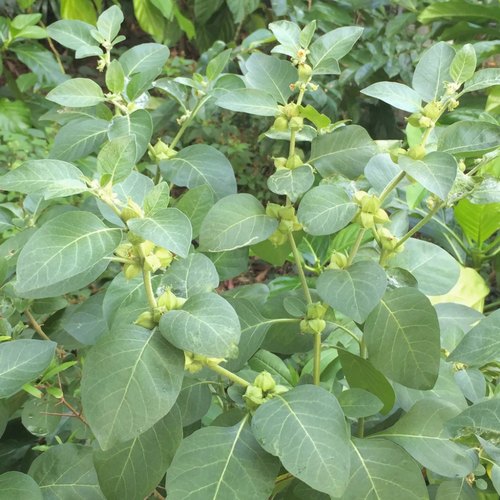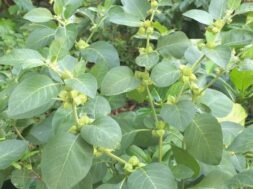
Covid-19: “Ashwangandha” goes for Study in UK as Recovery Medicine
Manas Dasgupta
NEW DELHI, Aug 1: At a time when the government is feeling concerned over India’s ‘R-Value’ inching up, the union ministry of Ayush has entered into a collaboration with the United Kingdom’s London School of Hygiene and Tropical Medicine (LSHTM) to conduct a study on ‘Ashwagandha’ for promoting recovery from COVID-19.
A Ministry spokesman said the All India Institute of Ayurveda (AIIA), an autonomous body under the Ministry of Ayush, and the LSHTM have signed a Memorandum of Understanding to conduct clinical trials of ‘Ashwagandha’ on 2,000 people in three U.K. cities — Leicester, Birmingham and London (Southall and Wembley).
‘Ashwagandha’ (Withania somnifera), commonly known as ‘Indian winter cherry’, is a traditional Indian herb that boosts energy, reduces stress and makes the immune system stronger. It is an easily accessible, over-the-counter nutritional supplement in the U.K. and has a proven safety profile. The positive effects of ‘Ashwagandha’ have been observed in Long COVID, which is a multi-system disease with no evidence of its effective treatment or management.
It added that the successful completion of the trial could be a major breakthrough and give scientific validity to India’s traditional medicinal system.
“While there have been several studies on ‘Ashwagandha’ to understand its benefits in various ailments, this is the first time the Ministry of Ayush has collaborated with a foreign institution to investigate its efficacy on COVID-19 patients,’’ the Ministry said.
According to AIIA director Tanuja Manoj Nesari, who is also a co-investigator in the project along with Rajgopalan, coordinator–International Projects, the participants have been randomly selected. Sanjay Kinra of the LSHTM is the principal investigator of the study.
“For three months, one group of 1,000 participants will be administered ‘Ashwagandha’ (AG) tablets while the second group of 1,000 participants will be assigned a placebo, which is indistinguishable from AG in looks and taste. Both patients and the doctors will be unaware of the group’s treatment in a double-blind trial,” Dr. Nesari said.
The participants will have to take the 500mg tablets twice a day. A monthly follow-up of self-reported quality of life, impairment to activities of daily living, mental and physical health symptoms, supplement use and adverse events will be carried out.
It took over 100 meetings spanning about 16 months through both diplomatic as well as regulatory channels for signing of the MoU, Dr. Nesari said. She added that the study had been approved by the Medicines and Healthcare Products Regulatory Agency (MHRA) and certified by WHO-GMP. It was being conducted and monitored as per the internationally recognised GCP (Good Clinical Practices) guidelines, she added.
Recently, a number of randomised placebo controlled trials of AG in humans in India have demonstrated its efficacy in reducing anxiety and stress, improving muscle strength and reducing symptoms of fatigue in patients treated for chronic conditions. It has also been indicated for treating non-restorative sleep, a hallmark of chronic fatigue, for which the trials are currently ongoing. Combined with substantial literature on its pharmacological and immunomodulatory effects in vitro and in animals, the study suggests ‘Ashwagandha’ as a potential therapeutic candidate for alleviating the long-term symptoms of COVID-19.
“After the trial’s success, ‘Ashwagandha’ will be a proven medicinal treatment to prevent infection and be recognised by the scientific community worldwide,” the Ministry noted.
It added that despite successful vaccine development, COVID-19 continued to pose a substantial threat to health in the U.K. and globally. More than 15% of adults in the U.K., where the clinical trials on ‘Ashwagandha’ was going to take place, and more than 10% globally had been infected with the Sars-Cov-2 virus.
Meanwhile, the All India Institute of Medical Sciences (AIIMS) chief Randeep Guleria stressed on the need for aggressive containment strategies in the parts of the country that are witnessing a surge in fresh Covid infections with R-value increasing.
“Starting from .96, and going all the way up to 1, the rise in R-Value is a cause of concern. Simply put, this means that the chances of infection spreading from a person, who has Covid, to others have gone up. The areas which are witnessing this surge should bring in restrictions and employ “test, track, and treat” strategy to break the chain of transmission,” Dr Guleria explained. The R-Factor is an indicator of the effective reproductive number of a virus.
India on Friday recorded 44,230 fresh infections, the highest single-day surge in three weeks but on Sunday, the daily cases has come down to little over 41,000. The fresh spike in cases has been worrying in Kerala and some northeastern states. Forty-six districts in the country have a positivity rate of more than 10 per cent, the government said on Saturday.
This week, reports quoting the US health authority – the Centers for Disease Control and Prevention (CDC) – said Delta variant of the coronavirus may cause more severe illness than all other known versions of the virus and spread as easily as chickenpox.
Explaining this, Dr Guleria said: “Measles or chicken pox used to have R factor of 8 or more, which means one person could infect eight others. That suggests that coronavirus is highly infectious. We saw that during the second wave in India, because entire families were getting infected. This happens with chicken pox also. In a similar manner, when one person has Delta variant, the whole family is vulnerable.”
With a large majority of fresh Covid cases coming from Kerala, there’s a need to evaluate the surge in infections, Dr Guleria further stressed. “In the beginning, Kerala had set a precedent for others by managing the pandemic well. They also had an aggressive vaccination drive. Yet despite that, are witnessing a spike in a way that’s different from other parts of the country. This needs to be evaluated. Also, is there a variant behind the surge? Are containment strategies being aggressively followed – all this needs to be evaluated,” the AIIMS chief explained.
Neighbouring states like Karnataka and Tamil Nadu also need to adopt aggressive testing strategy to break the chain of transmission, he added.
In Tamil Nadu, 66 per cent of people have developed anti-bodies, a recent serosurvey showed. Yet the state has been witnessing a spike. The sero surveys, however, are not an indicator of herd immunity, Dr Guleria explained. “In Brazil, similar survey from a city showed 70 per cent of population had antibodies. Yet there was a huge outbreak. We really don’t know what’s the cut-off in such cases, and also the antibodies gradually decrease over a period of time. It, however, shows that the chances of serious infections are lesser. For instance in Kerala, and the UK, people are getting infected, they may be spreading to others but they are not getting serious infection,” he said.













